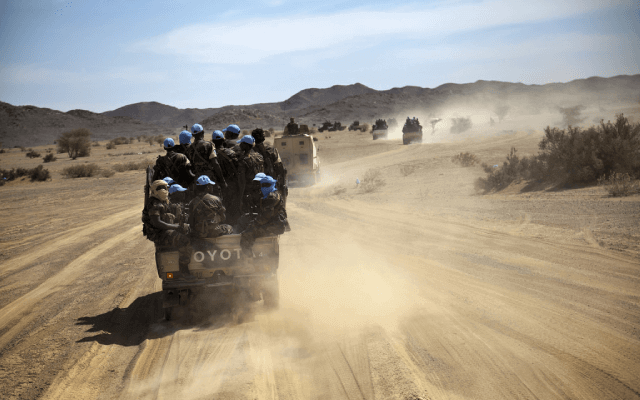During a meeting on Sunday, the African Union (AU) ’s Peace and Security Council (PSC) approved an Egypt-authored document detailing mechanisms to reinforce the United Nations (UN) peacekeeping missions in the region. The document, called the “Cairo Roadmap”, was created after a high-level regional conference in the Egyptian capital held in 2018.
The PSC meeting was presided by Egypt’s Permanent Representative to the AU and envoy to Ethiopia Osama Abdel-Khalek, as Egypt assumed chairmanship of the Council earlier this month. Abdel-Khalek told members of the Council that the roadmap had been approved in December 2019 when the African defence ministers met in Cairo under the framework of a specialized technical committee for security and defence established by Egypt’s Defense Ministry.
The Cairo Roadmap presents several recommendations made by African states and put together by Egypt to support the UN Secretary-General’s initiative to continue peacekeeping work while simultaneously preserving the interests of the African nations’ who contribute the most to peacekeeping troops. Egypt is ranked as the world’s seventh-largest contributor to the UN peacekeeping forces.
Abdel-Khalek stressed on the four main axes that the document sets out to intensify peacekeeping missions’ performance. This includes the promotion of political solutions within the UN peacekeeping mandate with clear, enforceable, and progressive mandates. It also includes increasing the accountability of all actors involved in peacekeeping missions, including regular forces and civilian peacekeepers. Further, the roadmap focuses on addressing the program’s shortcomings and providing equipped, trained regular troops to participate in these missions while developing their training methodologies.
Another salient feature of the roadmap is its focus on the targeted training and support for women in uniform. The document encourages member states to establish innovative partnerships like the Elsie Initiative to reach the UN target of 15% women’s participation in military positions and 20% in police deployments. Further, the document urges the Secretariat and member states to adopt strategies beyond incentives and targets to support women by ensuring equal participation in training and leadership roles.
Most importantly, the document has urged member states to “advance the implementation of the UN zero-tolerance policy on sexual exploitation and abuse (SEA), with its victim-centered approach, and to jointly assess the effectiveness of the measures undertaken thus far in eradicating SEA crimes in peacekeeping operations.” Previously, in 2015, the UN created a trust fund and other psychological, employment, and service programs for victims of abuse by peacekeepers, including education and food programs for children fathered by soldiers and workers. In the same year, it also began publishing the nationalities of the workers who were named in these cases in an attempt to deter such depraved acts in the future. In 2017, the international organization established a mechanism to compulsorily send victim advocates as part of peacekeeping missions; logs and reports, along with updates on cases, are readily available for public access.
But none of these measures have been enough. The roadmap’s insistence of equal participation of the Secretariat and member states in tackling this issue is extremely crucial, given the rising number of cases where women, especially in poorer African nations, have accused peacekeeping troops of sexual harassment and assault. The Human Rights Watch notes that peacekeepers have a track record of abuse, with Haiti and Uganda being just two examples among many countries where workers have either raped or sexually exploited women and girls in exchange for security or food. UN forces in the Central African Republic, the Democratic Republic of Congo, and African Union troops in Somalia have all been pulled up for their actions.
Overall, the roadmap aims to enhance the performance of peacekeepers by calling for (i) a clear and adaptable political strategy; (ii) a shared responsibility between all stakeholders and peacekeeping actors; (iii) strategies that cover the entire life cycle of the mission (“from the mandate to exit”), (iv) capable leadership, (v) an integrated approach to ensure implementation, including the involvement of the UN development system.
AU Peace and Security Council Adopts Egyptian Plan to Boost UN Peacekeeping
The Cairo Roadmap suggests several reformatory measures to support peacekeeping work while simultaneously preserving African interests.
October 27, 2020

SOURCE: CCCPA
